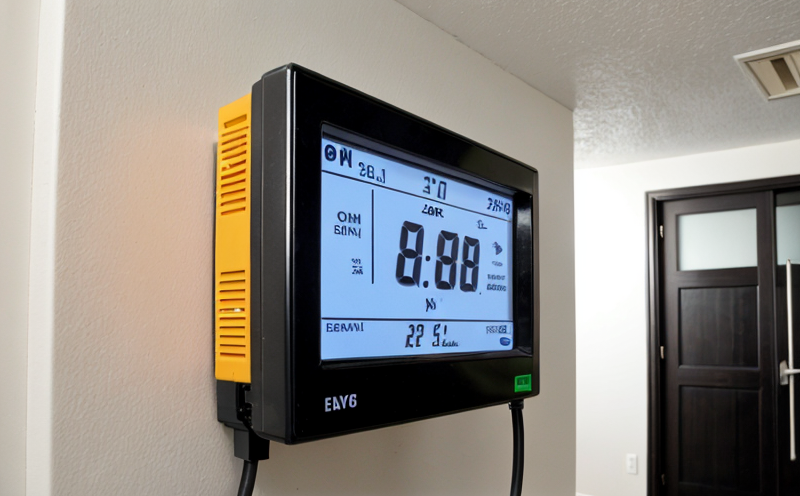ISO 50001 Energy Management System Efficiency Testing
The ISO 50001 standard provides a framework to help organizations effectively manage their energy use and reduce costs. The key requirement of the standard is to establish an energy management system (EMS) that integrates and applies processes with the objective of improving energy performance.
Our service focuses on ISO 50001 Energy Management System Efficiency Testing, which ensures compliance and continuous improvement through a structured approach. This testing evaluates whether the EMS is implemented effectively, leading to measurable reductions in energy consumption and costs. Our team specializes in this area, providing detailed reports that highlight areas for optimization and recommend actionable steps.
For businesses operating within regulated industries such as oil and gas, utilities, manufacturing, and transportation, ISO 50001 compliance is not just a best practice but often a legal requirement. By conducting these tests, we help organizations ensure they meet the criteria set out in the standard, thereby enhancing their reputation and sustainability credentials.
The testing process involves several key steps: initial assessment, baseline measurement, implementation review, continuous monitoring, and reporting. Each step is crucial for identifying inefficiencies and tracking progress over time. Our team uses advanced methodologies and tools to ensure accuracy and reliability of the results.
Our approach ensures that clients not only meet regulatory requirements but also gain a deeper understanding of their energy use patterns. This insight enables them to implement targeted improvements, leading to long-term cost savings and reduced environmental impact. We offer tailored solutions for different sectors, ensuring that our testing aligns with specific industry best practices.
The benefits of ISO 50001 compliance extend beyond legal obligations; they also contribute significantly to a company's overall performance. By adopting an EMS, organizations can improve their operational efficiency, reduce waste, and enhance resource management. This holistic view helps businesses achieve greater sustainability while maintaining profitability.
In summary, our ISO 50001 Energy Management System Efficiency Testing service is designed to help companies navigate the complexities of energy management effectively. It offers a pathway to achieving sustainable growth by leveraging best practices and continuous improvement methodologies. Whether you are looking to comply with industry standards or simply enhance your operational efficiency, we provide comprehensive support tailored to meet your specific needs.
Why It Matters
The importance of ISO 50001 Energy Management System Efficiency Testing cannot be overstated in today's world where sustainability and cost-effectiveness are key drivers for businesses. As global energy demands continue to rise, organizations must find ways to optimize their energy usage without compromising productivity or quality.
- Regulatory Compliance: Many industries are subject to strict regulations concerning energy efficiency. Non-compliance can lead to fines and reputational damage.
- Economic Benefits: Reducing energy consumption directly translates into lower operational costs, which is crucial for maintaining competitive advantage in the market.
- Sustainability Goals: Achieving sustainability targets set by governments or internal policies is easier when a robust EMS is in place. This not only helps meet external expectations but also fosters an environment of continuous improvement.
Incorporating ISO 50001 into your business strategy ensures that you are proactive rather than reactive regarding energy management. It provides a structured way to identify, implement, and maintain efficient practices, which ultimately leads to better resource utilization and minimized environmental impact.
Environmental and Sustainability Contributions
The implementation of ISO 50001 Energy Management System Efficiency Testing plays a pivotal role in promoting environmental sustainability. By optimizing energy use, organizations contribute significantly towards reducing greenhouse gas emissions and conserving natural resources.
- Reduced Carbon Footprint: Through systematic identification and reduction of unnecessary energy consumption, businesses can substantially lower their carbon footprint.
- Conservation of Resources: Efficient resource management helps prevent waste and ensures that precious resources are used optimally.
- Better Waste Management: Improved energy efficiency often leads to better overall operational efficiencies, including more effective waste handling practices.
In addition to these tangible benefits, adopting ISO 50001 also enhances an organization's reputation as a responsible corporate citizen. This positive image can attract customers who value eco-friendly products and services, thereby expanding the market reach.
Our testing service goes beyond mere compliance; it encourages a culture of sustainability within the organization. By fostering this mindset at all levels, we help businesses create lasting changes that benefit not only themselves but also society as a whole.
Competitive Advantage and Market Impact
In today's competitive market, having a well-implemented ISO 50001 Energy Management System Efficiency Testing can give your organization a significant edge over competitors. Here’s how:
- Cost Savings: Reduced energy costs translate directly into increased profits, making you more cost-effective compared to less efficient competitors.
- Enhanced Reputation: Demonstrating commitment to sustainability enhances your brand image and can be a key differentiator in customer decision-making processes.
- Innovation Leadership: By continuously improving energy efficiency, you show leadership in innovation, which is highly valued by investors and stakeholders alike.
Moreover, ISO 50001 compliance opens doors to new markets where sustainability is a key criterion for doing business. For example, many government contracts and international certifications specifically require adherence to environmental standards like ISO 50001.
The competitive advantage gained through ISO 50001 goes beyond mere compliance; it fosters a culture of continuous improvement that permeates every aspect of the organization. This commitment to excellence not only strengthens your position in current markets but also prepares you for future challenges and opportunities.





